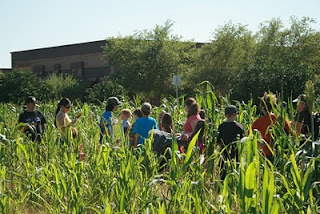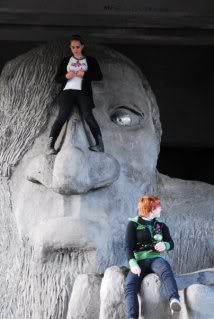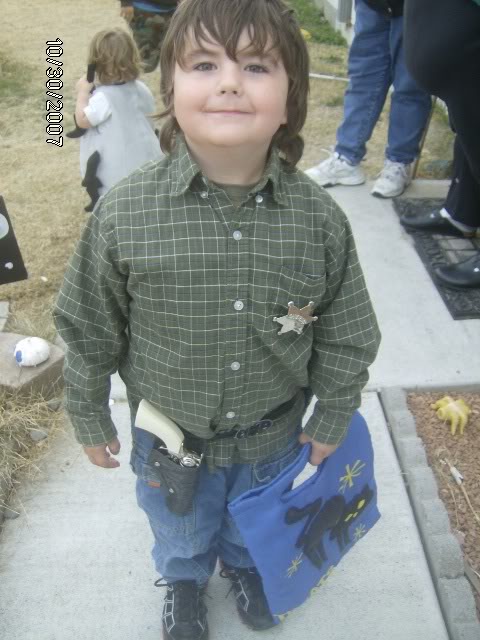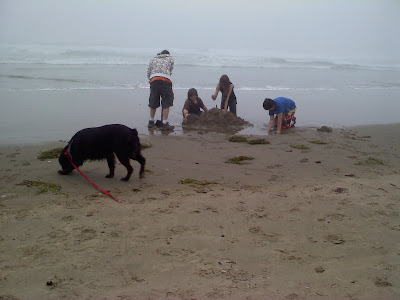
Photos are links.
When I was in school, the only bad grades I ever got were C's in "conduct" or deportment. I talked too much. I didn't leave other kids alone. I was told many times, "You're not here to socialize."

The worst part about homeschooling is the name. 😉 It suggests being at home all day but nothing could be further from the truth. Once you're away from school thinking, it becomes clearer that the kids in school are the ones in an unnatural social environment. When else in life are you trapped with 30 people of the same age for 6 hours a day with no way to escape? In the real world, we get to choose friends based on interest. And that's what unschoolers get to do. There are classes and park days and online friends and people of all ages that homeschoolers interact with.It's not that it's easy for all homeschooled kids to find friends. It can be hard. But I think adults idealize school and think being with all those kids solves all their social needs when for too many kids the friendships formed are more for convenience than because the kids actually like each other. Too often kids have to change who they are to fit in. My friends in school were more based on similar temperaments than because we had anything else in common. Being a girl into science fiction and engineering, there just weren't any others with similar interests.
For introverted kids being forced to be social all day with people you share nothing with other than age is a huge stressor. In real life we get to choose the type of work we do and the company we work for so that it better matches our needs. And if we find there are insolvable problems we always know we can search for a new job. Not so kids in school. They're stuck.
My daughter has had the freedom to blossom at her own pace, find friends she really clicked with, has gotten to know her social needs and listen to what she needs not warp herself into socialization imposed on her. She's very comfortable in her own skin and has friends all over the world she's met through her interests in music and art. (And liking to draw '80s hair metal bands is way more esoteric than science fiction but she's found a lot more friends than I had surrounded by kids in school. 😉
Joyce


Don't think of it as erring.-=-At what age did you begin providing regular social interactions with other children-=-
And don't think of it as "just" spending time together.
SPEND freely of copious hours and days of joyful time together.
Don't just spend time together.
I will say "from birth" and then I will ask you to replace "other children" with "other people."Tadaa!!!
Your problem is schoolish.
You're believing that five year old girls need to play with a dozen other five year old girls. If you turn 180 degrees away from the myth and fantasy of how many friends kids have at school, and look at the real world in which you plan to live, things will look different.Find people to visit, find places to go where other people will be. Begin to see people as people, rather than as pre-schoolers or school-age, or second grade. Just practicing that will take you MUCH nearer to peace about interactions with other people.
RVB (Robin): When people have given us a hard time about socialization, my husband has responded, "Oh, not to worry. Once a week, I take her into the bathroom and beat her up for her lunch money." That's a longer "bean dip" conversation stopper.
Schuyler: Oh I like that!
hahamommy: me too!
Gil (Guest5): Me too
Schuyler: Would stop many a conversation
JillP: That's the best one I've heard yet!!
Schuyler: Has he given her a swirly?
RVB: Bwaahaha


socialization:Accept that your child may not be as popular as you want. If your child is lonely, then look for ways to help her make friends, but if your child is content being on her own, then accept that.
Being popular is not the same as having social skills. As a homeschooling parent you may find yourself being pestered about whether or not your children have social skills. Do not let yourself start thinking that your child needs to be popular with other kids his or her own age in order to prove to these other parents that you are doing the right thing.
Social skills are different than popularity. Social skills involve knowing how to carry on a conversation, put up with people one doesn't like, and make patient suggestions to others. Ironically, schools may be the hardest place to really learn these things because one is locked up all day with other people who haven't yet learned those skills either. Allowing your child opportunities to be around people of all ages is probably much more beneficial.
Let your child be herself. Teach her to love that self and to be compassionate to others. That, in my mind, are the only two social skills you need. Everything else comes with that.
I say "What do you mean?"The rest is here, lower left.
Usually the question is asked by rote, the same way adults ask stranger-children "Where do you go to school?" Most people just blink and stammer, because they don't even know what they meant when they asked it.
The herd can infect your child with more than measles and mononucleosis. Every morning, the parent prays:
I hope my children are not ridiculed, humiliated, ostracized or excluded, subject to the expression of hatred, discrimination or prejudice. I hope my children do not satisfy their need to belong by joining a cult, a gang, getting 15 piercings and tattoos or becoming sexually active with irresponsible partners and entangled in an unwanted pregnancy.Amen.I hope my children do not attempt to prove their courage by stealing, trying drugs, committing violence or vandalism, or by associating with children involved in these activities. And if by chance they do, I hope they do not turn into liars to prevent me from knowing the truth about the conflicts they are facing.
Robert A. Wagner
an educator and former public school teacher

I am afraid that they will miss all the other kids and friendships that they have in the public school.**
They probably *will* miss being with their friends everyday. Are there reasons that will prevent you from getting them together after school and on weekends and over the summer?
If they are true friends, they'll want to spend time together. If the friendships are based only on the shared experience of school then don't they deserve the chance to form friendships around common interests?
School does remove the burden from parents' shoulders of getting kids together with other kids but we don't really think about the quality of the socialization. Would we as adults like to be locked in a room with 30 adults of the same age from our town for 6 hours a day only to be let loose for lunch and recess? Would we consider that an ideal way to make friends? Kids make the best of the situation they're forced into, but is the situation really the best?
Homeschooled kids get the opportunity to form friendships with people of all ages based on interests rather than birthyears. There's homeschooling support groups, scouts, art and dance and martial arts classes, 4H, church groups, neighborhood kids and so on. It can be more difficult depending on the town's services and the parent's willingness to take advantage of opportunities, but some homeschooling parents end up finding their kids social lives *too* active!
**But what about the school dances and parties, and all the little things that they will miss out on? I keep thinking about when I was a child in school, and I want them to experience as much of the wonderful qualities as I did.**
And you're forgetting about all the crap you had to put up with in between those parties: being forced to learn about dull things you didn't care about, homework, tests, pop quizzes, rude kids, the humiliation of gym class, *not* being asked to a party (and the social stigma that went with that), the demoralization of being constantly judged by teachers and peers, and so on. Kids pretty much accept the burden of all that because they know they don't have a choice. Sort of the same way people bear being a prisoner.
The main thing we get is that unschooling works for us because our kids are so bright. Countering that is tough, because, well, of course I think my kids are the most amazing people on the planet! And it is true that our unschooling is tailored to their strengths. Our unschooling tends to be somewhat cerebral. We do a lot of things that are pleasing to the academically inclined: lots of words, lots of writing, lots of reading. And my kids actually enjoy their state-mandated standardized testing. They test well, producing lovely, academically reassuring annual test scores.But I try to explain that unschooling works because all kids, regardless of their so-called intelligence quotients, thrive when they get to pursue what matters to them. I know a lot of unschoolers, and they are all bright and amazing. Most of the time, I have no idea—literally NONE—where those kids would rank in a classroom setting or how they would score on a standardized test. Who cares?
WHO CARES?
What matters is that they are bright, happy, interesting, accomplished, engaged and engaging. Unschooling doesn't only work for kids of "above-average intelligence," or kids whose parents are teachers, or kids who can recite the alphabet while twirling a baton, or any other limiting factor.
Unschooling works because the unschooled individual has the time and support to follow the interesting byways that lead to real learning.
Ronnie's answer to that and other questions, with background: click here


